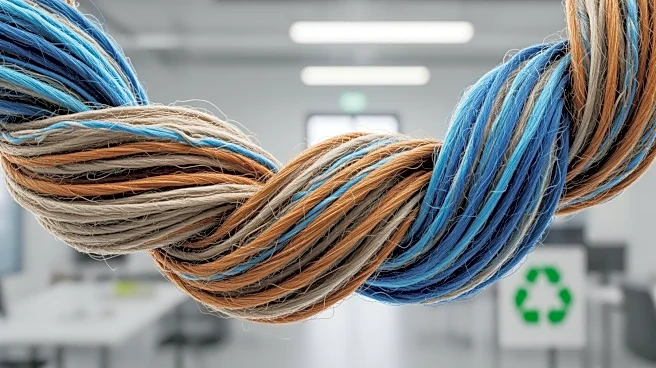What's Happening?
Circ, a Virginia-based startup, is pioneering a new approach to textile recycling with the backing of Patagonia. The company has developed a chemical process that separates polycotton materials into their
original fibers, allowing them to be regenerated into new, virgin-quality textiles. This innovation addresses the challenge of recycling blended fabrics, which constitute a significant portion of the global textile market. Circ's technology is likened to 'unbaking a cake,' as it breaks down polyester to its building blocks, separates it from cotton, and reintegrates them into the supply chain. Major brands like Allbirds, Zara, and H&M are already incorporating Circ-recycled textiles into their products. The startup has raised $100 million from investors including Patagonia, Temasek, and Breakthrough Energy Ventures, and is expanding globally with a new recycling plant in France.
Why It's Important?
The fashion industry is a significant contributor to global greenhouse gas emissions, accounting for 4% to 10% of the total. Despite this, less than 1% of clothing is recycled into new garments due to the complexity of breaking down blended fabrics. Circ's technology offers a solution by enabling the recycling of polycotton blends, which are otherwise destined for landfills or incineration. This advancement supports the shift towards a circular economy in fashion, reducing waste and environmental impact. Brands that prioritize sustainability, like Patagonia, are investing in Circ to scale this innovation, which could transform the industry by making recycled textiles more accessible and economically viable.
What's Next?
Circ is expanding its operations with the establishment of its first industrial-sized textile-to-textile recycling plant in France. This move marks a significant step in scaling its technology to meet global demand. As Circ continues to grow, it may attract more partnerships with major fashion brands seeking sustainable solutions. The success of Circ's technology could encourage further investment in textile recycling innovations, potentially leading to broader industry changes. Stakeholders will likely monitor Circ's progress and its impact on reducing the environmental footprint of the fashion industry.
Beyond the Headlines
Circ's approach to textile recycling not only addresses environmental concerns but also revives the legacy of Danville, Virginia, once home to the largest textile mill in the U.S. By situating its headquarters there, Circ is contributing to the local economy and preserving the region's historical connection to textile manufacturing. This development highlights the potential for sustainable innovation to revitalize communities and industries that have been affected by economic shifts. As Circ's technology gains traction, it may inspire similar initiatives in other regions, fostering a broader cultural shift towards sustainability in manufacturing.









